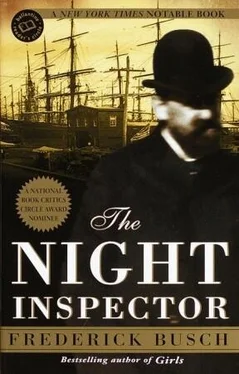“Of course not,” I said, but he did not hear me.
“I came downstairs for my breakfast. Lizzie spoke of the night before. I had been asleep, having worked at something about the Holy Land after supper, but Lizzie, often a lighter sleeper, had gone downstairs at one or two of the morning, summoned by Malcolm’s rapping at the door. She did remonstrate, she says, but in a motherly and gentle way. Can you not hear it? ‘Dear fellow, this is simply too late. Can you not try harder for us?’ So she says it was, and so it was. In and up goes Malcolm and up he remains in the morning, late for work. Lizzie sends one of the girls — I had left for work by now, and was at the river and plying what must forever be my trade. And she goes up and calls at his door, and he says, ‘Yes.’
“That is his last word. And that it should be ‘Yes,’ in affirmation of his sister, or of home and domestic love, or of his own fault in jeopardizing his job, I find nearly intolerable in the weight of emotion with which it lands upon me, shipmate. ‘Yes.’ ”
“Yes,” I said.
“I told Lizzie to leave him be. His reception at work would be his own worst punishment, and he would learn, if from nothing else, then from that. A man must take the consequences, I told her, and off I went.”
“Oh,” I said. “I see. It was then that you went, and not earlier.”
“Earlier? What was — earlier. Yes. Lizzie tried during the day, at odd hours, to rouse him. It was not unusual for him to sleep so hard, so deep, that he could not be wakened. He loved to sleep, that fellow, and so dearly he sleeps now at Woodlawn. Sleeps he and sleeps he, down at the bottom, where the oozy weeds about him twist.
“That was a day, you might recall, when we ate a chop and drank some ale and spoke of the War, and the need for compassion for those who surrendered. I did have difficulty in persuading you! But of course, you were there, and they tried to shoot you down, and you, in turn, them. So much more simple for the unwounded man to be compassionate. I admired so your willingness to turn — ah, you see.…”
“The other cheek. Indeed. What’s left of it. So I am given to understand that you were late returning.”
“Returning?”
“Home. The night you found—”
“Tardy and tied to the masthead and lashed for it, I can promise you. She lit into me with the Cat that night. But paused to tell me of his long sleeping, his silence all the day, and the door locked from within. I had it down, I can tell you. I sent it off the hinges and down.”
He poured gin and missed the glass with a good deal of it. I rose to take the bottle from his hands and pour again. He nodded his gratitude. He could not speak. His eyes looked painted on, not pained; his eyes looked dead in his gleaming face.
“In bed,” he whispered. “In his nightclothes. Pistol on the pillow. Head at the far corner of the bedclothing. Eyes unclosed. A terrible wound in his temple. Bits of skull and skin, skeins of drying blood. Dead, dead, dead, dead, dead, dead, dead, my Malcolm dead. His eyes not shut, and looking at me”—his head came up, his own eyes rested upon me, giving little light forth—“and Lizzie atop him, pulling at his shoulders, demanding that her son wake up.”
“Poor soul.”
“He must have been playing with the pistol, for his hand was still around it, you see.”
“Oh. Around it, then. I thought it was upon the pillow.”
“As was the hand in which it lay. Of course.”
“Of course. Please …”
“I took her from the room and then returned. I had to tell him good-bye.”
According to a newspaper, the coroner’s jury said this verdict: “That the said Child came to his death by Suicide by shooting himself in the head with a pistol at said place while laboring under temporary insanity of Mind.” According to another: “The deceased was one of two sons in the family, their father well-known in literary circles.” According to a third: “The youth, 18 years of age, son of a well-known literary gentleman, committed suicide yesterday by shooting himself with a pistol.” And, weeks later, according to Mr. S. Mordecai, in the Boston Weekly Advertiser: “The boy was armed with a deadly pistol, suitable for military purposes. He was enlisted in the Guard of the Army of the United States. Soldiers die, with and without pistols, and perhaps there is solace in the boy’s embrace of danger. By all accounts, his father knew dangerous days in his own youthful past, and perhaps he and his grieving wife can find comfort in what we might think of as the courage of their son.” You sob sister, Sam, I thought as I read.
“In his coffin, he lay so sweetly, with the ease of a gentle nature. Ah, Mackie: You never gave me a disrespectful word, nor in any way ever failed in your filialness,” he said, more to the gin in his glass than to me. If a ship came in, I thought, I would have to pretend to be the inspector. And I should like, I thought, to see the captain and the pilot who would hand the lading bill to a man in a little white mask.
Filialness, I thought.
“But just a boy,” he said. “And his brother cannot hear . He wanders the house in his own interior silence, as if he has heard, already, far too much. The gunshot, I wonder.” He looked up. “Do you think?”
“I have been deafened by shots.”
“Just so.”
“But they were shots that I fired. The detonation in the cartridge, you see, occurs at the level of the ear. It is natural, at times, for a loss of hearing to take place.”
“But not, then, you think, if the shot occurs elsewhere? In a different room?”
“Perhaps your son — Stanwix?”
“Stanny, yes.”
“It may be that he wishes not to have heard.”
He shook his head. “I must drink my drink,” he said. “As to wishing and hearing: He has heard, and we all, one way and another, have heard. There is no retreat from knowledge. If there were— But you don’t think him mad? My son?”
“Perhaps sad, then. Sad?”
“Sad,” he said. “The universe is diminished and it closes in upon us when a child dies. Certainly, sad.” He said, “We buried him in his military apparel, did I say? He has gone from us a soldier. But he fights no more.”
It was half past five, and Mrs. Hess’s place was still, it being too early for the nightbirds and too late for those who wandered through the city after midnight and into the dawn. Through the thick carpeting and past the flock of the wallpaper and under the heavy door with its brass handle and silent latch came sounds of women laughing or talking low while conducting the tasks one associates with kitchens in the latter afternoon. Jessie had not lit the lamps, and we lay in shadows and a kind of grainy light that strives for darkness. She smelled like the docks — of heat, and spices of the bitter sort, and heavy oils. She tasted like foods I had not eaten but had read about — mangoes, and the milk of coconuts. And, for all our long acquaintance and fondness, I despaired of knowing her.
She finally said, “Oh, my. Oh, well.”
I reached for the floor beside the bed, then forced my hand from the mask. I returned the hand to my side and felt the chill of the heavy sheets. “It’s the second time I’ve failed,” I said.
“No, you mustn’t regard it as failing.” She rolled toward me and kissed my arm, while her long, naked leg lay hard against my own leg, hip to hip and knee to knee. “Could this, in fact, be the third?” she asked.
“Are you counting, you mercantile woman? And the word is failed . If I’m here to enter you and haven’t and can’t, then the transaction is a failure.”
“No, dear. You aren’t here to enter me. You have a tongue and fingers. You have toes. There are candles on the stand, as long as you’re careful. You could enter and set up housekeeping, for all that. Which, I would wager, is precisely why. You are not here to fuck like a stoat. You are here for me. There are emotions in the room.”
Читать дальше












